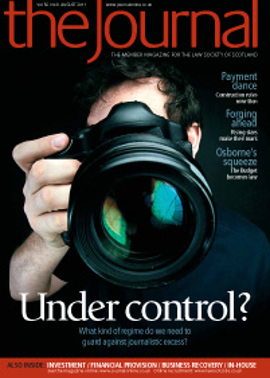Fairness in repossession

Since the dust settled on the Supreme Court decision of RBS v Wilson in November 2010, the industry has been getting to grips with the new process for repossession actions, which requires a calling-up notice in every case. Many lenders are seeking to have actions which do not comply with the judgment dismissed. But who should be liable for the expense of those actions?
In the period immediately following the decision, the majority of cases were dismissed with no finding of expenses in favour of either party. More recently, however, borrowers (and their agents) have increasingly been seeking an award of expenses in their favour, or alternatively, an undertaking from the lender that no costs associated with non-compliant action will be added to their account.
Solicitors for borrowers have made a number of compelling submissions. Some have argued that expenses follow success, and as the lenders are effectively abandoning the action, they have been unsuccessful. Another argument is that lenders should have been following the case and taken a “belt and braces” approach by issuing calling-up notices. Others have raised issues of fairness, suggesting that lenders are better placed to absorb the costs than borrowers who may already be experiencing financial difficulty.
However, the lenders’ position is simple. The Supreme Court accepted that lenders in Scotland followed a long established procedure, endorsed in the leading case, Bank of Scotland v Millward, and lenders should not be penalised for a change in the application of the law. There is no indication in the dicta that the judgment is designed to penalise lenders. The issue of calling-up notices was not one of the points of appeal, so lenders could not have predicted the shock judgment and its implications.
Furthermore, the actions were not defended on the basis that they were incompetent, and in most cases mortgage rights minutes have been lodged. As the lender’s action is no longer compliant, neither are the mortgage rights minutes, so it is appropriate to dispose of the cases on a no-expenses basis.
Whilst the majority of lenders have been successful in seeking no award of expenses against either party, the courts have given varying reasons.
For example, in Paisley, a sheriff took the view that to award expenses against the lender would be inconsistent with the apparent intention of the Supreme Court. A Glasgow sheriff held that it was not appropriate to penalise the lender who would then pass the charges on to their shareholders. In Perth, the view was taken that the lender should not be penalised for what was, in effect, a change to the law. In Hamilton, a case was dismissed on a no-expenses basis as a mortgage rights minute had been lodged and not a defence challenging competency.
The next issue to emerge will undoubtedly be liability for the expenses of the new actions and the double charging of costs relating to both proceedings, including contractual charges, to the mortgage account.
We have heard of lenders taking completely opposite approaches, with some writing off the expenses of the non-compliant actions, and others intending to charge both sets of costs to the mortgage account. The response to the latter approach remains to be seen.
It is significant that no formal guidance has been issued by either the FSA or the CML in Scotland, despite the publication of a front page article in The Herald on 25 June. The sensationalist and rather misleading headline indicated that lenders had been “beaten” by Scottish householders in relation to the costs associated with having to raise fresh actions for repossession where the earlier action was now non-compliant. It reported that the FSA had “intervened” and warned lenders that they would have to bear any such costs.
Lenders were quick to contact their advisers and it soon became apparent that the FSA had made no formal statement on the matter of costs. This was confirmed by CML Scotland. I have not found on the FSA’s website any reference to any formal statement or guidance being issued.
There is a passage in the Financial Services Consumer Panel Annual Report 2010-11 referring to mortgage repossession costs. It is stated that the Panel challenged lenders’ representations on double charging and, “as a result of their work, the FSA is now monitoring firms’ behaviour”; and that the FSA has spoken to the CML and suggested guidance. If that is the case, lenders have not been appraised of any monitoring or action being taken against them.
Fairness to borrowers is paramount – that is something that we all agree on. The difficulty is how to ensure this when a consistent approach is not being insisted on. Of course, each case has to be treated on its own merits, but further confusion in the press does not help in what can only be described as a very grey area at the moment. Lenders and borrowers alike will be watching closely for further developments.
In this issue
- Take five
- Shared concerns
- Fairness in repossession
- The price of freedom
- Next month: your new look Journal
- A tale of two cities
- Ready money
- The longest arm of the law
- Return to normality?
- Ghost of decree past
- Shaping the world order
- Bright lights
- "One Profession" comes together
- From the Brussels office
- Ask Ash
- Give it a push start
- Up to the job?
- Spotlight on fairness
- Human rights abroad
- Heightened AWaReness
- Recipe for fudge
- My late father
- Getting closure
- Website review
- Book reviews
- Clearer view
- Rules of engagement






